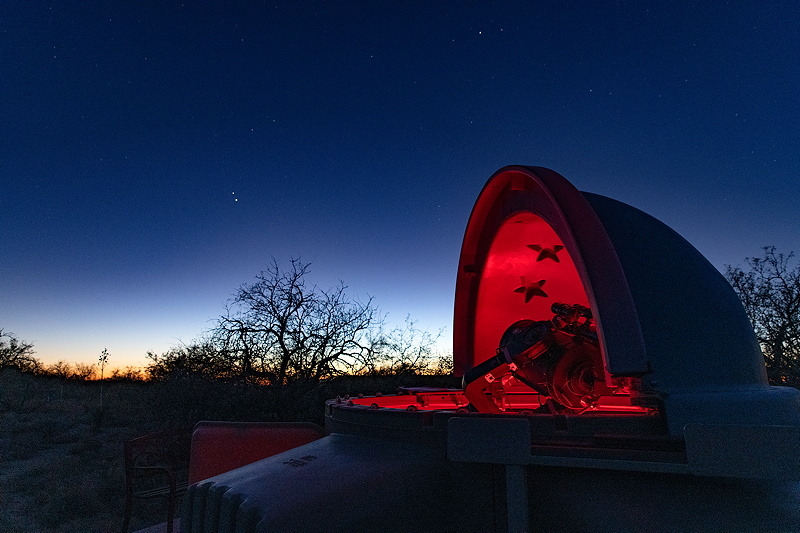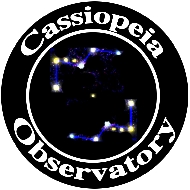Jupiter & Saturn Conjunction 45'18" on Dome
Posted: 15 December 2020
Sunday, 13 December 2020, was mostly cloudy, eliminating the opportunity to observe the Geminid Meteor Shower at its peak. Monday, 14 December, dawned with a still cloudy but pretty golden sky at sunrise. Mid-day the wind increased, but the sky cleared late afternoon.
|
Open: Monday, 14 December 2020, 1732 MST Temperature: 52°F |
Session: 1570 Conditions: Mostly clear, windy |
Equipment:
12" f/8 LX600 w/StarLock
2" 24mm UWA eyepiece
2" 30mm eyepiece
2" 50mm eyepiece
Camera:
iPhone 11 Pro Max
D850 DSLR
1736 MST: LX600 ON, StarLock OFF, High Precision OFF.
1738 MST: viewed Jupiter and the four Galilean Moons and Saturn, 102X. Both planets, separated by 45'18", were visible just inside the eyepiece field-of-view (FOV).
Switched to a slightly wider FOV with the 30mm eyepiece. Mounted the iPhone 11 Pro Max on the 2" 30mm eyepiece using the Levenhuk adapter. Took this afocal 81X image of the planets using NightCap Camera (ISO 32, 1/11sec, 1X lens). The four moons of Jupiter are visible at the left.

Then viewed the planets using the 2" 50mm eyepiece (49X). Saturn's moon Titan was now visible.
I stepped outside of the observatory and took this photo of the planets and the observatory using the D850 DSLR on a tripod (f/4, 1 second, ISO 3200, FL 24mm).

Mouseover or tap on image for labels
At 1830 MST the twilight sky was dark enough to attempt photographing the planets projected by the 50mm eyepiece (49X) onto the SkyShed POD dome. This is an f/2.8, 30 seconds, ISO 3200, FL 24mm, image showing both planets on the observatory dome.

Mouseover or tap on image for labels
As the planets get closer together each night, finally being 6' apart (1/5th of a Full Moon diameter in the sky) on Monday, 21 December 2020, I will be able to increase the magnification for viewing and imaging on the dome.
1852 MST: the wind was calm now. Took a final look at the planets, 49X.
1900 MST: LX600 OFF.
1906 MST: took a Sky Quality reading and reported the result to Globe at Night.
|
Close: Monday, 14 December 2020, 1912 MST Temperature: 39°F |
Session Length: 1h 40m Conditions: Clear, SQM 20.98 |
Comments are welcome using Email. Twitter users can use the button below to tweet this report to their followers. Thanks.
Cassiopeia Observatory Home Page
Copyright ©2020 Michael L. Weasner / mweasner@me.com
URL = http://www.weasner.com/co/Reports/2020/12/15/index.html
